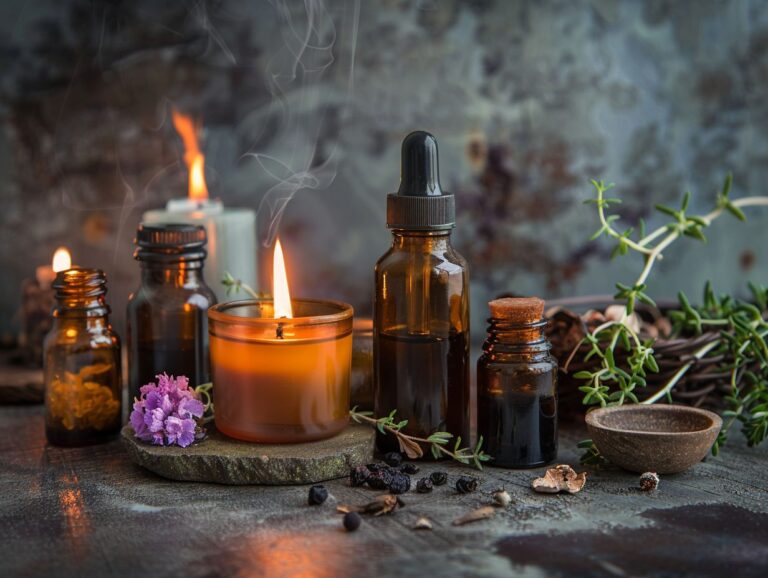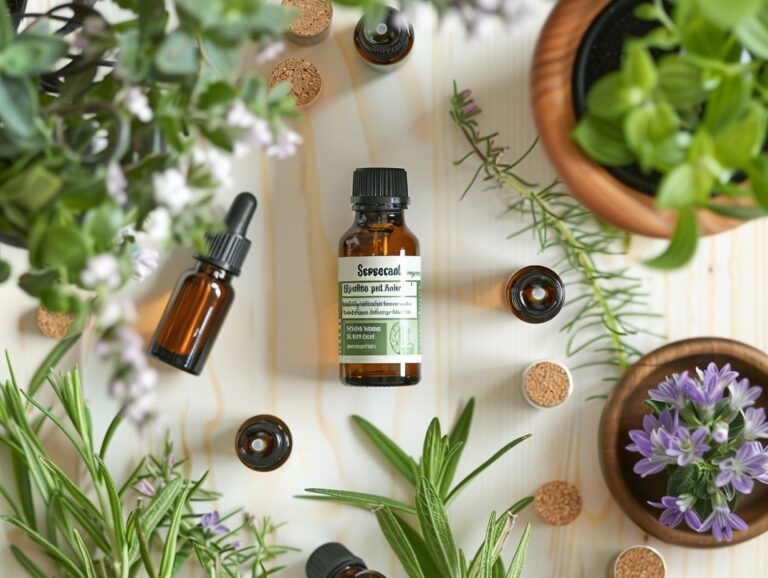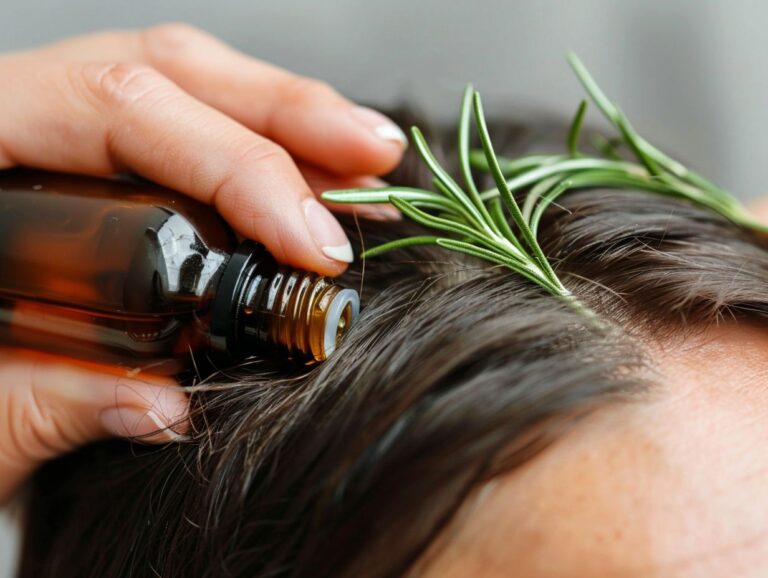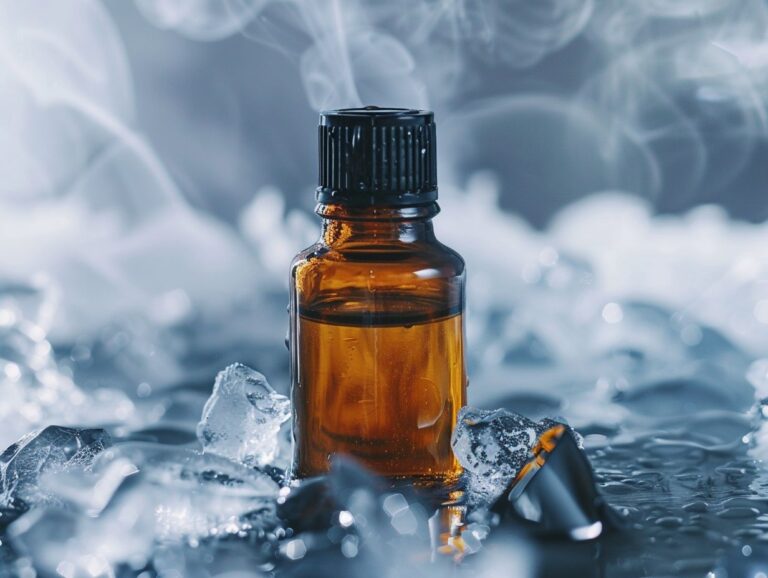Why Can’t I Smell My Essential Oils
Essential oils have become increasingly popular for their therapeutic benefits and aromatic properties.
If you find yourself unable to smell these oils, there may be underlying reasons causing this issue.
From nasal congestion to age-related changes, there are various factors that could be affecting your sense of smell.
We will explore the potential causes of not being able to smell essential oils, possible solutions, and the risks of using them when you can’t detect their scent. For more information, check out why essential oils smell bad.
Key Takeaways:
What Are Essential Oils?
Essential oils are concentrated extracts derived from plants that capture the plant’s scent and flavor. They are commonly used in aromatherapy for their potential health benefits and aromatic qualities.
These oils are primarily extracted through methods like distillation, cold pressing, or solvent extraction, depending on the plant source and the desired oil.
Aromatherapy
A practice that dates back centuries, utilizes these oils to promote emotional, psychological, and physical well-being.
Popular types of essential oils include lavender, peppermint, tea tree, and eucalyptus, each offering unique properties. Lavender, for example, is known for its calming effects, while peppermint is often used for its refreshing scent.
How Are Essential Oils Used?
Essential oils are often used by diffusing them in a room to create a pleasant scent and deliver potential health benefits through inhalation.
Diffusion is one of the most popular methods of using essential oils, where a few drops are mixed with water in a diffuser and dispersed into the air. This not only helps in enhancing the aroma of a space but also promotes relaxation and uplifts mood.
Another effective way to enjoy the benefits of essential oils is through topical application. By diluting oils with a carrier oil and applying them to the skin, individuals can experience targeted relief and nourishment.
Inhalation, whether through direct sniffing from the bottle or adding a few drops to a cloth or tissue, allows for quick absorption of the oil’s properties into the bloodstream, offering therapeutic effects.
What Is The Sense Of Smell?
The sense of smell, also known as olfaction, involves the detection and recognition of odors through complex processes that can lead to olfactory fatigue, sensory adaptation, and in some cases, nose blindness.
Olfaction relies on specialized cells in the nose that detect chemical molecules in the air, converting them into signals sent to the brain for interpretation.
Olfactory fatigue occurs when exposure to a scent diminishes its perceived intensity, as the sensory receptors become less responsive. This phenomenon is closely related to sensory adaptation, where the brain becomes accustomed to continuous stimuli and reduces its responsiveness over time, causing scents to seemingly fade away. Nose blindness, on the other hand, can develop when an individual is exposed to a particular smell for an extended period, making them less able to detect it.
How Does The Sense Of Smell Work?
The sense of smell works through the detection of odor molecules by specialized sensory cells in the nose, which then send signals to the brain for interpretation. This process plays a crucial role in our overall health and well-being.
These sensory cells, known as olfactory receptor neurons, are located in the upper part of the nasal cavity and are directly connected to the olfactory bulb in the brain.
When we inhale essential oils, the volatile compounds within them bind to specific olfactory receptors, triggering a cascade of neural signals that are processed in the brain’s limbic system. This intricate interaction between tasting essential oils and olfactory receptors can evoke emotional responses, influence mood, and even impact cognitive functions.
Studies have shown that the therapeutic properties of essential oils can have tangible effects on health by reducing stress levels, improving sleep quality, and enhancing overall well-being, highlighting the profound connection between scent perception and our physical and mental health.
What Are The Different Types Of Smells?
Different types of smells can be classified into categories such as natural scents from essential oils, artificial fragrances from synthetic oils, and diffused scents from ultrasonic diffusers.
When we talk about natural scents, we delve into the world of botanical essences that are derived directly from plants, flowers, fruits, and other natural sources to produce a wide array of delightful aromas.
On the contrary, artificial fragrances, created using synthetic oils, mimic nature’s scents but are man-made compositions designed to replicate specific odors.
Now, with the rise in popularity of ultrasonic diffusers, diffused scents have taken on a new form of dispersal, where these devices emit a fine mist of water and essential oils into the air, creating a subtle and continuous fragrance throughout a space.
Why Can’t I Smell My Essential Oils?
There are various reasons why you may not be able to smell your essential oils, including issues related to the room size, diffuser problems, or other factors affecting diffusion and perception.
Room size plays a crucial role in the effective spread of aromas from essential oils. A smaller room may intensify the scent, while a larger or more open space could dilute it. Ensuring adequate air circulation and placing the diffuser at an elevated spot can help disperse the aroma more evenly.
The type and quality of the diffuser can impact the diffusion of essential oils. Check if your diffuser is clean and functioning properly. Regular maintenance and using the right amount of essential oil can enhance the overall experience.
Nasal Congestion

When nasal passages are congested, the scent receptors are unable to properly detect the intricate notes of essential oils. This can lead to a diminished experience of aromatherapy, as the full range of therapeutic benefits may not be realized. Diffusing oils in such conditions may not only result in a less potent aroma but also limit the positive effects on the mind and body.
To address this issue, individuals with nasal congestion can try steam inhalation with eucalyptus oil or peppermint to clear their sinuses before diffusing other essential oils. Using a warm compress on the sinus area can help alleviate congestion and improve scent perception during aromatherapy sessions.
Anosmia
Anosmia, the loss of smell, can reduce the ability to perceive diffuser scents and blend fragrances, impacting one’s olfactory experience and potentially diminishing the enjoyment of aromatherapy.
When an individual experiences anosmia, the intricate notes and nuances of various essential oils and fragrances may go unnoticed, depriving them of the sensory delights that aromatherapy can offer.
Enhancing scent perception in individuals with anosmia involves exploring alternative ways to engage the olfactory system, such as using stronger scents or focusing on tactile and visual sensory cues to complement the olfactory experience. By selecting suitable diffuser blends that are intense and have a robust aroma, individuals with anosmia can potentially stimulate their olfactory receptors more effectively.
Age-related Changes
Age-related changes in olfactory sensitivity can impact the experience of diffusing essential oils, potentially requiring adjustments in room size or diffuser settings to accommodate altered scent perception.
As individuals age, their sense of smell tends to decline, making it harder to detect and appreciate different scents. This decrease in olfactory sensitivity can vary from person to person, and it often means that stronger scents or larger amounts of essential oils may be needed to achieve the desired aroma in a room.
When diffusing essential oils in smaller spaces, like bedrooms or bathrooms, using a less overpowering oil concentration and a smaller, more localized diffuser may be more effective. Conversely, in larger areas such as living rooms or open-concept spaces, a higher oil concentration or a powerful diffuser might be necessary to disperse the scent evenly.
To make the most of the olfactory experience for individuals with age-related changes, consider using essential oil blends with a variety of notes that can stimulate different scent receptors. Mixing scents such as citrus for freshness, floral for relaxation, and woodsy for grounding can create a well-rounded aroma profile that appeals to a broader range of sensitivities.
Plus adjusting the diffusion method and oil concentrations, incorporating sensory exercises like smelling different scents regularly can help enhance scent perception and maintain olfactory function as individuals age.
Medications
Certain medications can interfere with the ability to smell scents, particularly affecting the perception of synthetic oils and potentially impacting one’s health through altered olfactory responses.
When someone is taking medication, it can interact with the body’s olfactory system, leading to changes in the way scents are perceived. This change can be notable when it comes to synthetic oils, as medications might distort the way these artificial fragrances are interpreted by the brain.
Medication-induced alterations in scent perception can have broader implications for health outcomes. An individual relying on their sense of smell to detect hazards or spoilt food might face challenges in accurately recognizing odors due to medication interference.
For those who still wish to utilize essential oils while on medication, it is crucial to consult a healthcare professional for guidance. Managing potential interactions between medications and essential oils is vital to ensure the desired benefits without any adverse effects.
Smoking
Smoking can diminish the ability to detect scents from reed diffusers and fragrance oils, affecting the overall olfactory experience and potentially reducing the effectiveness of aromatherapy practices.
When an individual smokes, the chemicals present in tobacco smoke can dull the sensitivity of the olfactory receptors in the nose, making it harder to perceive scents accurately. This decrease in scent perception not only impacts the enjoyment of fragrances but can also interfere with the benefits of aromatherapy.
The lingering smoke particles and odors from smoking can also overwhelm the subtle aromas released by reed diffusers and fragrance oils, making it challenging to fully experience their intended effects. To counteract this, smokers can consider creating designated smoke-free areas in their living spaces to preserve the purity and efficacy of their chosen scents for relaxation and wellness.
What Are The Possible Solutions For Not Being Able To Smell Essential Oils?
If you are experiencing difficulty in smelling essential oils, there are several solutions you can try, such as improving diffuser smell performance and implementing proper cleaning tips for better diffusion.
One effective solution for enhancing the olfactory experience with essential oils is to consider the placement of your diffuser. Ensuring that the diffuser is placed at an optimal height can help disperse the aroma more effectively throughout the room.
Regularly cleaning your diffuser is crucial for maintaining its performance. Using distilled water and a gentle cleanser to wipe down the diffuser can prevent buildup and ensure a consistent scent output.
Another tip is to mix and match different essential oils to create unique scent combinations that appeal to your preferences. Experimenting with various oils can help you discover new favorite aromas.
Clearing Nasal Congestion
Clearing nasal congestion is essential for improving the effectiveness of aromatherapy practices and enhancing the diffusion of scents through a diffuser.
Several methods can be employed to alleviate nasal congestion, such as using a saline nasal spray, employing steam therapy by inhaling steam from a bowl of hot water, or utilizing a humidifier in your living space to add moisture to the air.
Unobstructed airflow in the nasal passages is crucial as it allows for proper reception of the scent molecules present in essential oils. To incorporate essential oils into the clearing process, you can add a few drops of oils like eucalyptus, peppermint, or lavender to a bowl of steaming water and inhale the vapor to help clear congestion and stimulate sensory perception.
Consulting A Doctor

Seeking advice from a healthcare professional is advisable for individuals experiencing persistent issues with scent perception in aromatherapy practices, as it can help address underlying health concerns related to olfactory function.
While aromatherapy is widely considered a complementary approach to enhancing well-being, alterations in scent perception can sometimes indicate more serious health conditions that require medical attention. Ignoring persistent olfactory challenges may lead to delayed diagnosis and treatment of potential underlying issues. Individuals navigating such concerns should be mindful of changes in their ability to smell various scents, as these could be early indicators of health problems.
Trying Different Scents
Experimenting with different scents and adjusting the diffusion method in a large area can help enhance scent perception and ensure a more enjoyable experience with essential oils.
When selecting essential oils, it’s crucial to consider not only personal preferences but also the intended benefits. For example, lavender oil is often associated with relaxation, while peppermint oil can be invigorating. To effectively diffuse oils in a spacious room, utilizing technologies like ultrasonic diffusers or nebulizers can enhance coverage. Air circulation and strategic placement of diffusers can also impact the overall scent diffusion. Experimenting with various diffusion times and intensity levels can help tailor the experience to individual preferences, creating a personalized and uplifting ambiance.
Taking A Break From Essential Oils
Taking a break from using essential oils can allow your olfactory system to reset, especially in cases where prolonged exposure or large room sizes may have contributed to reduced scent perception and potential health effects.
By giving your nose a rest from constant exposure to strong scents, you give it a chance to recover and regain sensitivity to different aromas. Olfactory fatigue, if left unchecked, can impact your ability to fully appreciate and benefit from the therapeutic properties of essential oils. Remember that the size of the room and ventilation also play a crucial role in how the scents are perceived; smaller spaces can intensify the aroma, while larger rooms may require higher concentrations.
To maintain optimal olfactory sensitivity, consider incorporating aroma-free periods throughout your day. This could involve taking breaks in well-ventilated areas or spending time outdoors, allowing your nose to recalibrate itself. Rotating between various essential oils instead of using the same one continuously can prevent sensory adaptation and ensure that you continue to experience the full range of benefits.
Are There Any Risks Of Using Essential Oils If I Can’t Smell Them?
While the inability to smell essential oils may not pose direct risks, there are potential concerns such as skin irritation and allergic reactions that individuals should be aware of when using these aromatic substances.
When individuals engage in the application or diffusion of essential oils, skin contact becomes a crucial factor to consider, especially for those who do not experience the scent profiles. The skin is the largest organ of the body and can be susceptible to irritation when exposed to concentrated oils. This risk is heightened in scenarios where proper dilution ratios are overlooked, leading to potential redness, itching, or even more severe reactions.
- To mitigate these risks, it is essential for aromatherapy enthusiasts with olfactory challenges to perform a patch test before widespread application, ensuring their skin’s compatibility with the specific oil.
- Being vigilant about the quality and purity of the essential oils utilized is paramount. Contaminated or low-grade oils can significantly increase the likelihood of adverse skin reactions, triggering discomfort or unwarranted skin sensitivities.
- Adhering to recommended dilution guidelines and seeking guidance from healthcare professionals or certified aromatherapists can provide additional layers of safety assurance, especially for those navigating the world of aromatherapy without the assistance of scent perception.
Skin Irritation
Skin irritation can occur when essential oils are used in higher concentrations due to the absence of scent detection, emphasizing the importance of dilution and proper diffusion to prevent adverse reactions and promote skin health.
When undiluted, potent essential oils can overstimulate sensory receptors, overwhelming the skin and causing irritation. Diffusing these oils can help disperse the molecules, reducing the risk of direct contact and lessening the chance of adverse effects. Properly diluted oils through carrier oils or in diffusers can offer a more gentle, subtle scent experience while maintaining their therapeutic benefits.
Allergic Reactions
Individuals who cannot smell essential oils may still be at risk of allergic reactions if exposed to certain blends or synthetic oils, underscoring the importance of using hypoallergenic diffuser blends and quality oils to minimize adverse responses.
For those with impaired scent perception, identifying potentially allergenic ingredients solely by smell becomes challenging, which can result in inadvertent exposure to irritants. Choosing hypoallergenic diffuser blends and high-quality synthetic oils is crucial to mitigate the risk of allergic reactions.
When selecting diffuser blends, look for natural options such as lavender, chamomile, or peppermint, known for their soothing properties and low allergenic potential. Organic essential oils are also a safer choice as they are less likely to contain synthetic additives that may trigger allergies.
Interactions With Medications
Essential oils used in reed diffusers may interact with medications, posing health risks in individuals with compromised scent detection, necessitating caution when diffusing scents in medication-sensitive environments.
When essential oils are diffused, their aroma molecules can enter the bloodstream through inhalation, leading to potential interactions with medications being metabolized in the body. This can impact the effectiveness or side effects of certain drugs.
For instance, citrus oils like orange or grapefruit can interfere with enzyme pathways responsible for drug metabolism. It’s crucial for individuals using aromatherapy alongside medication regimens to consult healthcare professionals to ensure safety and efficacy. Always dilute essential oils properly and avoid prolonged exposure in enclosed spaces.
Frequently Asked Questions
Why Can’t I Smell My Essential Oils?
There are a few potential reasons why you may not be able to smell your essential oils:
- One possibility is that you have a stuffy nose or sinus congestion, which can interfere with your sense of smell.
- Another reason could be that the oils have expired or have been stored improperly, causing them to lose their potency.
- Certain medications or medical conditions can also affect your sense of smell and make it difficult to perceive scents.
How Can I Improve My Sense of Smell for Essential Oils?
If you are having trouble smelling your essential oils, there are a few things you can try:
- Clear your nasal passages by using a saline nasal spray or taking a hot shower.
- Make sure your oils are fresh and properly stored in a cool, dark place.
- Consider using a different method of diffusing, such as a personal inhaler, to get the oils closer to your nose.
Can Essential Oils Cause Loss of Smell?
In rare cases, essential oils may contribute to temporary or permanent loss of smell, known as anosmia. This can happen if the oils are used in excessive amounts or if they are not diluted properly. It is important to always use essential oils in moderation and to follow recommended dilution guidelines.
Why Do Some People Have a Better Sense of Smell for Essential Oils?
Some individuals may have a more sensitive sense of smell, known as hyperosmia, which allows them to detect scents more easily. This can also vary based on genetic factors and overall health.
Can Essential Oils Help Improve My Sense of Smell?
While essential oils are not a cure for certain conditions that may affect your sense of smell, they may be able to help improve your overall sense of smell. Some oils, such as peppermint and eucalyptus, have been shown to have a stimulating effect on the olfactory system. However, it is important to consult with a healthcare professional before using essential oils for this purpose.
What Should I Do if I Can’t Smell My Essential Oils?
If you are experiencing difficulty smelling your essential oils, it is best to consult with a doctor to determine the underlying cause. They can provide guidance on how to improve your sense of smell and whether essential oils may be a suitable option for you. It is also important to always use essential oils safely and according to recommended guidelines.









2 Comments